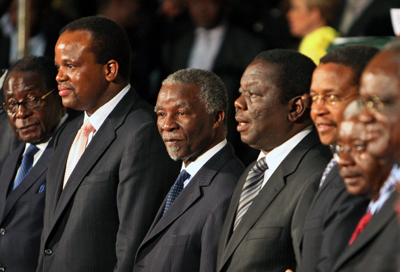
Nearly half a year after disputed elections and following two months of delicate negotiations, Zimbabweans on Sept. 15 welcomed the signing of a unity government agreement by President Robert Mugabe and opposition politicians.
While talks continue on assigning specific cabinet positions, the power-sharing agreement designates the new post of prime minister to Morgan Tsvangirai, leader of the Movement for Democratic Change (MDC). Arthur Mutambara, head of an MDC splinter faction, serves as deputy prime minister.
Mugabe’s Zimbabwe African National Union-Patriotic Front (ZANU-PF) is allocated 15 ministries, while 16 go to the two MDC factions. As prime minister, Tsvangirai heads a council of the 31 ministers, but President Mugabe leads the overall government, maintains veto power and controls the military.
Opposition sources say the talks are deadlocked as ZANU-PF seeks the ministries of finance and foreign affairs, among other powerful posts. Clearly, the MDC hopes to secure the most important ministries in order to implement its neoliberal economic policies. Tsvangirai also wants control of the police as a counterweight to the ZANU-PF dominated army.
Nonetheless, all three leaders made clear their commitment to carry out the agreement. In a symbolic gesture at the signing ceremony, Mugabe, Tsvangirai and Mutambara clasped hands beside Thabo Mbeki, the former South African president who mediated the deal, a remarkable sight considering the violence during the campaign for the June run-off elections which were boycotted by the opposition.
Events outside Zimbabwe may further complicate realization of the unity government. This week’s resignation by Mbeki, who mediated the negotiations on behalf of the Southern African Development Community, may embolden the two sides to stick to their positions.
During the elections and throughout the negotiations, the MDC questioned Mbeki’s impartiality and called for his replacement as mediator. Tsvangirai’s party hopes the new South African administration may be less supportive of Mugabe’s position, but analysts note the Zimbabwean president’s popularity among rank-and-file members of the governing African National Congress (ANC), especially its youth wing.
ZANU-PF, on the other hand, consistently praised Mbeki’s efforts but may consider his demotion by the ANC leadership as a chance to backtrack on power-sharing. Moreover, regional attention has shifted to next year’s South African elections which ANC leader Jacob Zuma is expected to win easily.
The global financial crisis may also weaken the willingness of capitalist nations to provide assistance to the new Zimbabwean government. The U.S. and former colonial ruler Great Britain fully supported Tsvangirai and made clear their willingness to help pull Zimbabwe out of its current economic mess, with inflation running at an incredible 11 million per cent, only if he comes to power.
Promises of economic assistance may be less generous when the European Union meets next month to discuss Zimbabwe. And in the U.S., the so-called Zimbabwe Democracy and Economic Recovery Act currently prohibits American representatives to international financial institutions from voting for aid to Zimbabwe. Sanctions also bar American companies from conducting business with Zimbabwe.
While Tsvangirai is often hailed as a labor leader who once called the International Monetary Fund and the World Bank “devils,” more recently as leader of the MDC he has been eager to invite those capitalist institutions into Zimbabwe, convinced their neoliberal programs will alleviate the economic problems Zimbabwe faces today.
ZANU-PF supporters, however, maintain that Washington and London are responsible for Zimbabwe’s economic meltdown, as their trade sanctions and backing of the MDC have destabilized the nation. Western hostility to Mugabe’s government became pronounced when the country’s controversial land redistribution program was initiated over a decade ago.
The corporate media has failed to report that the power-sharing agreement signed by both sides places blame for the country’s political crisis on the international community, particularly Britain, and declares there will be no reversal of the redistribution of white-owned farms, a major victory for veterans of the liberation struggle against colonial rule.
The power-sharing deal has been trumpeted as “an African solution to an African problem,” despite outside meddling. As Mugabe declared at last week’s ceremony, “African problems must be solved by Africans. The problem we have had is a problem that has been created by former colonial power. Why, why, why the hand of the British? Why, why, why the hand of the Americans here? Let us ask that.”











Comments